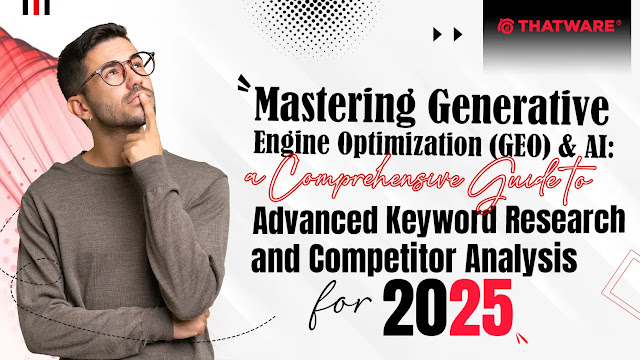The digital marketing landscape is constantly evolving, and with the rise of AI-driven technologies, a revolutionary shift is underway. Traditional SEO is no longer enough to stay ahead of the curve. Enter Generative Engine Optimization (GEO) — the next big wave in search visibility and content strategy. As platforms like Google and Bing integrate AI-based, conversational search models, marketers must now pivot toward a more sophisticated form of optimization. Thatware LLP, a pioneer in AI-driven digital marketing solutions, is leading this transformation with cutting-edge Generative Search Optimization techniques.
What is Generative Engine Optimization?
Generative Engine Optimization refers to the process of optimizing content for AI-powered search engines that generate answers using natural language processing (NLP) and large language models (LLMs). Unlike traditional search engines that rely heavily on keywords and backlinks, generative search engines interpret context, semantics, and user intent to provide dynamic, conversational results.
In this new model, search results are no longer a list of links but AI-generated answers derived from multiple sources. This shift calls for a new form of SEO — one that focuses on how AI understands, indexes, and retrieves content.
How Generative Search Works
Before diving deeper into Generative Search Optimization, it’s crucial to understand how generative search engines function. Powered by technologies like OpenAI’s GPT models and Google’s Search Generative Experience (SGE), these engines:
-
Interpret natural language queries in context.
-
Retrieve information from a wide range of indexed sources.
-
Generate conversational, human-like responses.
-
Cite source links selectively, often pulling from high-authority or context-rich pages.
This changes the game completely. It’s no longer just about being ranked on page one; it's about being featured in the AI's synthesized answer — a coveted space with higher trust and visibility.
Why Generative Engine Optimization Matters
The impact of generative search is profound. Users are moving toward longer, more natural queries — and they expect concise, informative answers. Businesses that fail to adapt to Generative Engine Optimization risk becoming invisible in this new search paradigm.
At Thatware LLP, our digital strategists have already seen the early effects of generative search on website traffic and engagement. Brands that invest in GEO now are positioning themselves to own the future of search.
Key Strategies in Generative Search Optimization
To rank in generative search engines, the approach to SEO must change. Here’s how Thatware LLP approaches Generative Search Optimization:
1. Semantic-Rich Content
AI engines prioritize content that’s semantically meaningful. This means your content should not just include keywords, but also address user intent, related concepts, and real-world applications.
2. Structured Data and Schema Markup
Proper implementation of structured data helps generative engines understand your content better. Use schema types like FAQ, How-To, Article, and Product to increase your chances of being cited.
3. Expertise, Authoritativeness, Trustworthiness (E-A-T)
AI-generated results tend to favor content from credible and authoritative sources. Establishing strong E-A-T signals across your website, such as author bios, citations, and links to research, can boost your inclusion in AI-generated answers.
4. Conversational Optimization
Generative models process queries conversationally. Optimizing for natural questions, follow-up queries, and related context makes your content more compatible with AI dialogue flows.
5. Entity-Based SEO
Search engines powered by LLMs focus on entities — people, places, topics, and relationships. Thatware LLP uses advanced NLP tools to help clients optimize content around core entities relevant to their niche.
6. Multimodal Content Integration
As generative engines begin processing images, videos, and text simultaneously, optimizing all forms of content becomes critical. Alt-text, video transcriptions, and AI-generated metadata all play a role in this evolving space.
The Role of AI Tools in GEO
One of the key elements of Generative Engine Optimization is leveraging AI tools for data analysis, content creation, and intent mapping. Thatware LLP uses proprietary AI platforms to:
-
Analyze LLM search outputs.
-
Predict future trends in generative search queries.
-
Optimize content dynamically based on real-time AI model behaviors.
AI is not just the medium of search—it’s also the method of optimization.
Challenges Ahead
While the promise of Generative Search Optimization is massive, there are challenges:
-
Limited visibility into how AI selects sources.
-
Content duplication risks from AI summarization.
-
The evolving nature of AI algorithms means strategies must adapt constantly.
Still, the brands that engage early, experiment, and stay agile will benefit the most.
Why Choose Thatware LLP for Generative Engine Optimization
As a trailblazer in AI-powered digital marketing, Thatware LLP offers unmatched expertise in Generative Engine Optimization. Our data scientists, SEO analysts, and content creators work together to craft future-proof strategies that help brands stay visible in the age of AI.
With years of experience in semantic SEO, entity optimization, and machine learning integration, Thatware LLP is uniquely equipped to help your business transition into the era of generative search.
Conclusion
The future of SEO is here, and it's powered by AI. Generative Engine Optimization is not just a trend — it’s a necessary evolution. To stay ahead of the curve, brands must adopt new methods, tools, and mindsets. Whether you’re a startup or an enterprise, embracing Generative Search Optimization can mean the difference between being found or forgotten.
Partner with Thatware LLP today to optimize for tomorrow.

%20&%20AI%20A%20Comprehensive%20Guide%20to%20Advanced%20Keyword%20Research%20and%20Competitor%20Analysis%20for%202025.webp)




.jpg)
0 Comments